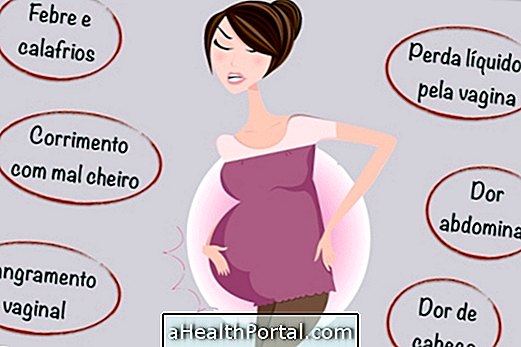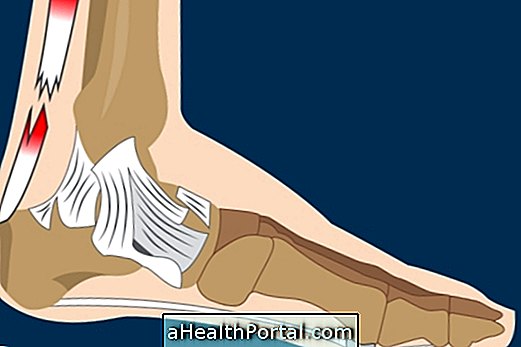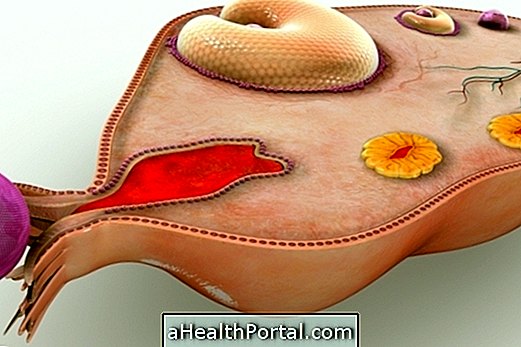Signs and symptoms of miscarriage can occur in any pregnant woman until 20 weeks of gestation. The main symptoms of a miscarriage are:
- Fever and chills;
- Vaginal discharge with bad smell;
- Loss of blood through the vagina, which may begin with a brownish color;
- Severe abdominal pain, an intense type of menstrual cramps;
- Loss of fluid through the vagina, with or without pain;
- Loss of blood clots from the vagina;
- Severe or constant headache;
- Absence of fetal movements for more than 5 hours.
Some situations that may lead to spontaneous abortion, that is, that can start from one hour to another without apparent cause include fetal malformation, excessive consumption of alcohol or drugs, abdominal trauma, infections and diseases such as diabetes and hypertension, when these are not properly controlled during pregnancy. See 10 Causes of Spontaneous Abortion.

What to do in case of suspicion
In case of suspected abortion, what to do is to go to the hospital as soon as possible and tell the doctor the symptoms you present. The doctor should ask for some tests to check that the baby is well and, if necessary, indicate the appropriate treatment that can include the use of medicines and absolute rest.
How to Avoid an Abortion
The prevention of abortion can be done through some measures, such as:
- Do not take medicines without the doctor's knowledge;
- Do not drink alcoholic beverages;
- Only practice light or moderate physical exercises or especially indicated for pregnant women;
- Perform the prenatal follow-up by attending all the consultations and performing all the requested tests.
Some women have a greater difficulty in carrying the pregnancy to the end, and are at greater risk of having an abortion, and therefore, they should be followed weekly by the doctor.
To prevent it, see also:
- Teas that the pregnant can not take
- Remedies that can cause Abortion
Types of abortion
Abortion can be classified as:
- Precocious - when fetal loss occurs before the 12th week of gestation.
- Late - when fetal loss occurs between the 12th and 20th week of gestation.
- Spontaneous - when fetal loss occurs naturally.
- Induced - due to medical termination of pregnancy.
- Inevitable - when you have pain or bleeding intolerable with dilation of the cervix.
- Incomplete - when expulsion of only part of the uterine contents occurs or there is a rupture of the membranes.
- Complete - when expulsion of all uterine contents occurs.
- Habitual - from the third spontaneous abortion.
- Withheld - when the fetus is held dead in the womb for 4 weeks or more.
- Septic - when you have infection of the uterine contents before, during or after an abortion.
Abortion is banned in Brazil, and only women who can prove in court that they have a fetus that will not be able to survive outside the womb, as can happen in the case of anencephaly - a genetic disorder where the fetus has no brain - abortion legally.
Other situations that can be evaluated by the judge are when the pregnancy is the result of sexual abuse or when it puts a woman's life at risk. In these cases the decision can be agreed with the Brazilian Federal Supreme Court by ADPF 54, voted in 2012, which in this case describes the practice of abortion as an "early delivery for therapeutic purpose." Apart from these situations, abortion in Brazil is a crime and is punishable by law.
In addition, it is important to remember that the woman can not also abort in case of other diseases such as Microcephaly or other genetic syndromes, such as Down Syndrome.
What Happens After Abortion
After the abortion, the woman should undergo a medical treatment that checks if there are still traces of the embryo inside the uterus and, if this happens, a curettage should be performed. The doctor may indicate that the woman takes medicines that cause the exits of the embryonic remains or can perform a surgery to withdraw the fetus immediately. See also what might happen after a miscarriage.


























